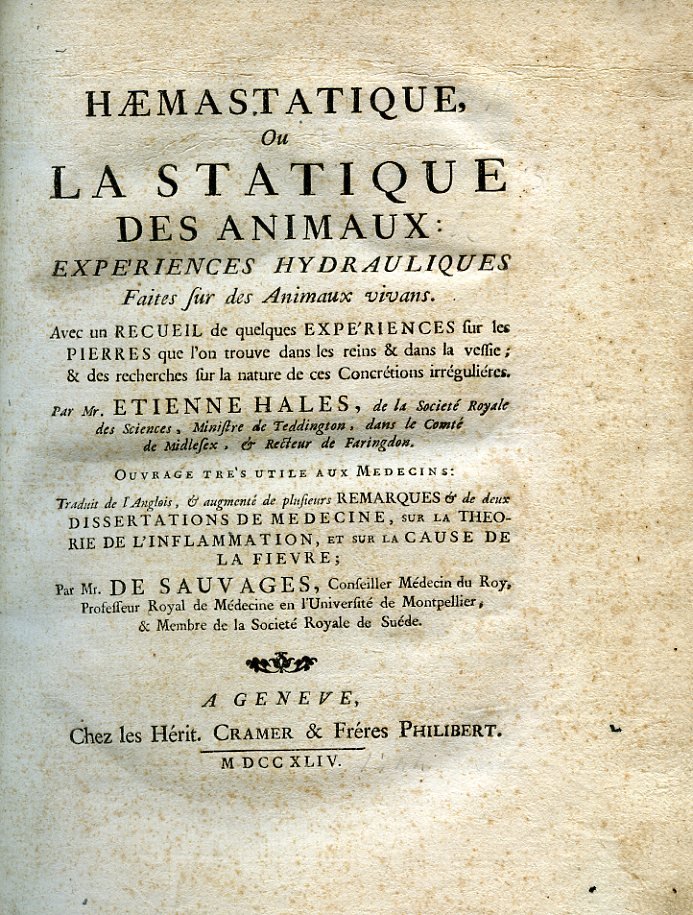Détails
Éditeurs
Chez les Hérit.[iers] Cramer & Frères Philibert
Thème
Scienze, Zoologia, Circolazione sanguigna
Description
In-4° (265x212mm), pp. XXII, (2), 352, (2) + (2) di catalogo editoriale (numerate 347-348), legatura novecentesca m. pelle rossa con titolo e ricchi fregi floreali e vegetali in oro al dorso. Piatti marmorizzati. Testatine e capilettera arabescati incisi su rame. A pieni margini e in ottimo stato, salvo sparse quanto lievi fioriture e bruniture. Prima versione francese di 'Statical Essays Containing Haemastaticks or an Account of Some Hydraulick and Hydrostatical Experiments .', fondamentale opera dell'Hales sulla circolazione sanguigna degli animali, seguita dagli studi dello stesso sui calcoli renali e vescicali, sulle infiammazioni e sulle febbri. 'In this work is recorded Hale's invention of the manometer, with which he was the first to measure blood-pressure. His work is the greatest single contribution to our knowledge of the vascular system after Harvey and led to the development of the blood-pressure measuring instruments now in universal use' (Garrison Morton). L'Hales (Beckesbourne, 1677-Teddington, 1761), fra i maggiori naturalisti inglesi del suo tempo, svolse le sue ricerche ricoprendo in parallelo sino alla morte la carica di parroco della città di Teddington, nel Middlesex. 'Stephen Hales, a modest country parson at Teddington measured the amount of water lost by plants through evaporation and related this to the amount of water present in a given area of soil in which plants were growing. He estimated rain and dewfall in this connexion, measured the rate of growth of shoot and leaves, and investigated the influence of light on plants. He experimented on gases and found that they were obtainable from plants by dry distillation. He was the first to realize that carbon dioxide was supplied to plants by the air and formed a vital part of the plant's food supply. These experiments led the way to those of Ingenhousz and de Saussure, while his ideas on combustion and respiration facilitated the discoveries of Black, Lavoisier, and Priestley. The second volume contains the studies on blood pressure which make Hales one of the founders of modern experimental physiology Hales's work marked the greatest advance in the physiology of the circulation between Harvey and the introduction of the mercury manometer and other instruments for the measurement of blood pressure by J. L. M. Poiseuille in 1828' (PMM). 'He was a sanitary pioneer, being the first to introduce ventilation, [and gave] the first clear enunciation of the existence of gases in a free and in a combined condition' (Foster, Lectures on the history of physiology, 231232). Cfr. Garrison-Morton, 765. Printing & the Mind of Man, n. 189: 'contains the studies on blood pressure which makes Hales one of the founders of modern experimental physiology. Hale's work marked the greatest advance in the physiology of the circulation between Harvey [and] J. L. M. Poiseuillé in 1828'. Blake, p.194. Osler, n. 1083. Wellcome, III, 194. Hirsch, III, 27. Roller-Goodmann, I, 503. Dibner, 26. Grolier-Horblit, 45. Sparrow, 91.


Découvrez comment utiliser
Découvrez comment utiliser

